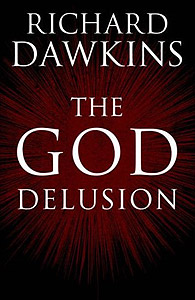
| HOME |
| NERVE |
| REVIEWS |
| ARCHIVE |
| EVENTS |
| LINKS |
| ABOUT US |
| CONTRIBUTORS |
| BACK ISSUES |
| CONTACT US |
 The God
Delusion
The God
Delusion
Richard Dawkins
Transworld, hardback, £20
Reviewed by Alex Hindley
According to the Christian version of things it all started with Adam and Eve. One of the best known biblical stories, its message seems to be that unquestioning obedience is the way to God's heart. Questioning and lust for knowledge can only lead to ruin. How anyone could fail to find this more than a little bit sinister is beyond me, and Richard Dawkins clearly agrees.
No one wants to mess with religious belief. It demands the highest order of respect, hiding behind the convenient explanation that belief is 'sacred'. What does that really mean? It means that you can't interfere with it. So religious belief, by definition, cannot be questioned. Convenient. This illogical loop is backed up solely by the threat of God's displeasure. If you don't believe in God you still have to contend with his followers, so it's no surprise that people in prominent positions in the media, politics or science generally prefer to stay away from the whole subject. No one wants death threats and smashed windows.
Luckily some people, Dawkins included, refuse to be intimidated. They still can't win, it seems. Apparently some things about religion don't even have to make sense. It's all about gnostic mysteries like the Trinity, or transubstantiation, or reincarnation or the nature of God himself – a being who knows everything and can do everything, but isn't sure if he can do the impossible, and still finds time to be deeply offended if you don't visit him once a week. When you put it in terms of faith, incomprehensibility is transformed into a badge of honour.
Dawkins doesn't believe in treating religious beliefs with more respect than any other kind, and this frees him to demolish all the popular arguments in favour of religion with embarrassing ease. The only argument he deems worthy of more than a brief mention is the argument from intelligent design (‘creationism in a cheap tuxedo’), and this is largely because it is often put into opposition with his own field of evolutionary biology.
He is passionate about his science and explains the distinction between 'random chance' and evolution at length, but he never becomes so immersed that he is hard to follow for those of us (like myself) not so well-versed in Darwinian theory. He is entertaining as well as enlightening. If I were to criticise at all I would say that occasionally he can come across a little condescending, implying at several points that religious believers simply have not yet had their 'consciousness expanded' by Darwin. Possibly it's his choice of phrase rather than his underlying attitude that is at fault. Even so, given the quality of the hate mail he receives you can forgive him for being less than impressed with the opposition.
He argues ultimately that religion is damaging to society and to the psychology of an individual. Given the strength of his feelings on the subject he does very well not to stoop to the level of preaching. He expresses himself clearly and reasonably, only occasionally indulging in sarcasm - most notably during his summation of the 'virtues' of the God of the Old Testament and the lessons taught in its verses. (Rape my daughters but don't sodomise my guest? Words fail me.)
This book is not meant to be discussion for discussion's sake. As far as Dawkins is concerned, atheism is the only reasonable conclusion given the evidence he presents, and he is quite open about his hope that agnostics and believers alike will be converted by it. Failing this his second purpose is to campaign for better treatment for those who 'come out' as atheists. He compares the position of atheists today, especially in America, to that of homosexuals and women before the rights movements of the last century. Not an entirely fair comparison in my eyes, but one that is hard to judge given that atheists so rarely band together and make themselves heard. There seems to be no doubt that atheism is seen in a very negative light in the most powerful democracy in the world (a country founded on secular principles, he reminds us). One study shows that more Americans would rather vote for a black person, a homosexual, a woman, a Jew or even a Mormon than an atheist.
The assumption behind this is probably that without religion we can have no morals. In his chapter titled 'The 'Good' Book and the Changing Moral Zeitgeist', Dawkins argues that this is far from being the case. The moral norms that we hold today are more advanced than those given to us by scripture. He points to evolutionary science as a factor in discouraging prejudice and discrimination, emphasising the similarities between people of both genders and all races. Surely there are many other factors involved, but the essential point is that we seem to have out-grown religion. Love of our fellow man really is enough to stop us from degenerating into savagery without our all-powerful, moralising ‘sky-fairy’ to punish transgressions.
Dawkins begins and ends his book with a plea that children, especially, be taught how to think, rather than what to think. He pleads not only for their right to chose their own beliefs and the challenges that come with them, but also for the advancement of the human race as a whole.
Above all the book was an enjoyable read and very thought provoking. It's impossible to cover all the high points in one review, suffice to say I highly recommend it!
This book can be ordered from News From Nowhere, Liverpool’s radical & community bookshop. A paperback edition will be available from 21st May 2007.